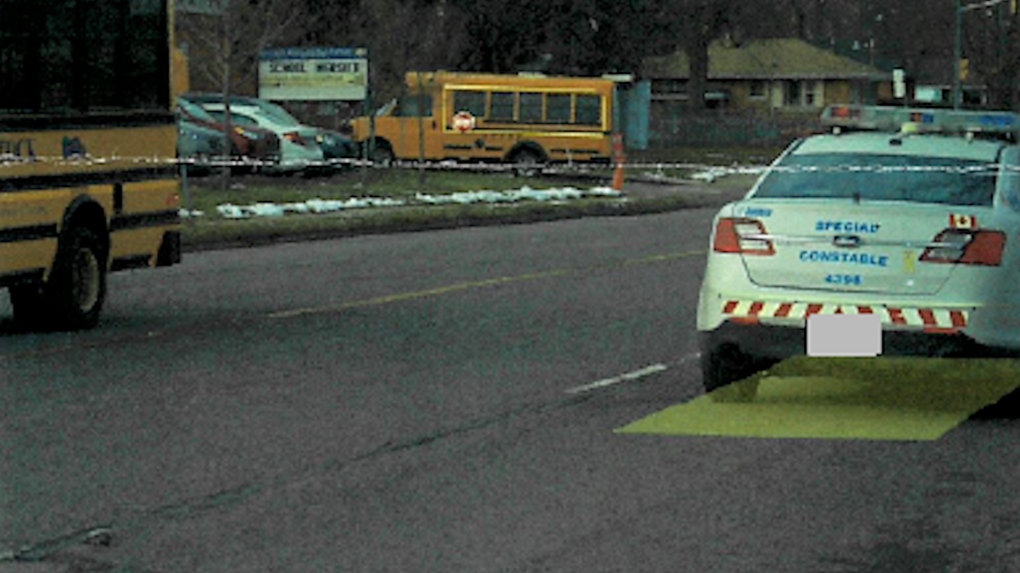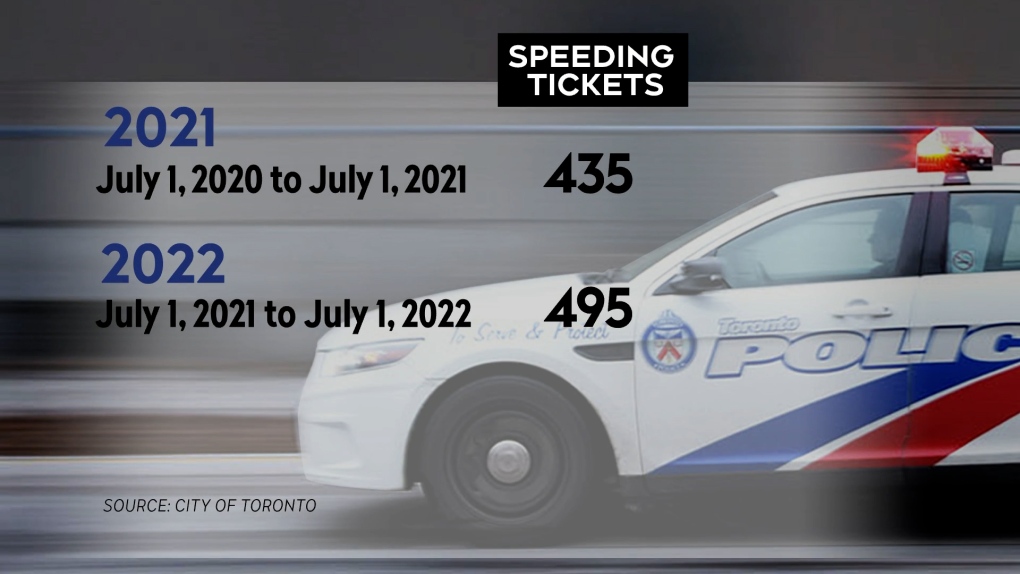Over 1K automated speeding tickets issued to Toronto police vehicles in 2-year period
The officers issuing Toronto's speeding tickets are also racking them up as well, as newly obtained data from automated speed and red light cameras shows cops in the city are facing fines for more than 1,000 incidents in a 26-month period.
The tickets and figures, obtained by CTV News through Freedom of Information requests, show evidence of Toronto Police Service (TPS) vehicles, including regular patrol cars, prisoner transport vehicles, special constable cars, and even parking enforcement cars, zooming past speed limit signs across the city.
- Download our app to get local alerts on your device
- Get the latest local updates right to your inbox
In one case, a special constable car was ticketed $120 for going 59 km/h in a school zone at pick-up time.
In another, a squad car is seen running the red light on King Street at Spadina Avenue just after 11 a.m. as a man is seen crossing in the crosswalk one lane over. That resulted in a $325 fine issued to the car.
 A photo included in a speeding ticket issued to a Toronto police special constable. (Freedom of Information request)
A photo included in a speeding ticket issued to a Toronto police special constable. (Freedom of Information request)
While the TPS says it frowns upon and follows procedures to deal with unnecessary speeding, figures show the number of tickets issued to police vehicles is trending upwards – from 435 in 2021 to 495 in 2022.
“We know that speed is the primary factor that determines whether someone is struck with a vehicle lives or dies. So the thought of police officers casually speeding around and potentially putting the public at risk is disturbing,” Jess Spieker of Friends and Families for Safe Streets told CTV News Toronto.
“The thought of police officers who are paid to uphold public safety in fact endangering public safety – that’s not good,“ Spieker said.
The figures show that several tickets were sent to parking enforcement vehicles, which typically do not deal with emergencies requiring high speeds. One car – PKW31 – was issued a $227.50 fine for going 65 km/h in a 40 zone at Renforth Drive and Lafferty St.
Just two days later, the same parking enforcement car sped through Bicknell Avenue at Avon Drive and was issued a $95 fine for going 45 km/h in a 30 km/h zone.
 Data shows traffic tickets issued to Toronto police are trending upwards. (Freedom of Information request)
Data shows traffic tickets issued to Toronto police are trending upwards. (Freedom of Information request)
Some tickets issued to police could be argued
Police are legally allowed to break certain traffic rules in the course of their duties if circumstances call for it.
Some of the cases of tickets issued to Toronto police vehicles show signs that they could be tossed, if challenged, as the speeds could be interpreted as justified.
One such ticket shows a cruiser following an ambulance through a red light, for example, and another set of tickets show a group of cars all going around 60 km/h in a 30 km/h zone in what could be a coordinated response.
The largest ticket in the sample was a squad car going 92 km per hour in a 50 km per hour zone on Jane Street at Lambton Avenue – though it’s not clear from the ticket itself whether the speeding in that case was justified.
According to city data, the spot that saw the most tickets issued to police vehicles was Beverley and D’Arcy streets, a few blocks of 52 Division in the downtown core. Fifty-five were issued at the intersection.
The next most common spot, at 44 tickets, was Sheppard Avenue East at Don Mills, just off Highway 404. In third, was Jane Street at Lambton Avenue, with 30 tickets.
The largest number of red light tickets issued to police was 23 at Warden Avenue and Ellesmere Road – many times more than any other location.
The largest quantity of tickets of any day was issued on Nov. 1, which includes the early morning hours of Hallowe’en.
What happens when a cop gets a ticket?
According to a TPS spokesperson, the service has a process in cases of officers being issued speeding tickets by automated enforcement cameras. In such cases, TPS pays the ticket up front and then, it’s up to supervisors to look into what happened and potentially dock the ticketed officer’s pay.
“In terms of process, Automated Speed Enforcement Notices involving TPS vehicles are sent to our Fleets and Materials Management team, who forward them to Professional Standards (PRS),” Stephanie Sayer wrote in an email. “PRS determines which unit the vehicle is from and notifies that unit’s Complaints Coordinator, who will then conduct an investigation to determine if an exemption is justified. If the Coordinator determines there was no justification, prescribed hours would be docked from the officer’s pay as a penalty.”
That system differs from the arrangement with, for example, TTC drivers, who are expected to pay for tickets themselves.
Data from TPS differs from City
CTV News first requested the speeding tickets issued to police vehicles in 2021, but was denied access on the grounds that disclosing the tickets could reveal investigative techniques, reveal law enforcement intelligence, and facilitate the commission of an unlawful act, and only provided the total number of tickets.
CTV appealed the denial twice with the province’s Information and Privacy Commissioner, and the TPS agreed to release a slightly redacted version of the tickets in February, following mediation.
In the interim, CTV News requested data from the City of Toronto, which provided figures on automated tickets that did not match the figures provided by the Toronto Police: in a smaller matching time period, the city figures showed about 30 more tickets.
That’s a concerning sign considering the Toronto Police just asked for and received a multi-million dollar budget bump from the City of Toronto, according to Anna Willats of the Toronto Police Accountability Coalition.
“Obviously they’ve got to look at what system they have for dealing with these tickets and they’ve got to change it,” Willats said.
The number of tickets issued to the Toronto Police is a tiny fraction of the tickets that are issued by the machines throughout the city – Toronto’s figures show some 380,000 tickets were issued in 2023.
CTVNews.ca Top Stories

Biden gives life in prison to 37 of 40 federal death row inmates so Trump can't have them executed
U.S. President Joe Biden announced on Monday that he is commuting the sentences of 37 of the 40 people on federal death row, converting their punishments to life imprisonment just weeks before president-elect Donald Trump, an outspoken proponent of expanding capital punishment, takes office.
Toronto weather: Advisories in effect ahead of 'significant' Monday snowfall
Holiday travellers and commuters could be in for a messy drive on Monday morning as a significant round of snowfall moves into the region.
Nissan, Honda announce plans to merge, creating world's No. 3 automaker
Japanese automakers Honda and Nissan have announced plans to work toward a merger, forming the world's third-largest automaker by sales as the industry undergoes dramatic changes in its transition away from fossil fuels.
Green Party's Elizabeth May reflects on unprecedented week in Canadian politics
Elizabeth May says in all her years on Parliament Hill she has never seen anything like the last week in Canadian politics.
The rent-a-friend industry is booming among Canada's Chinese diaspora
Dozens of people are offering rent-a-friend services on Xiaohongshu, a social media platform also known as Little Red Book or China's Instagram, in cities including Vancouver, Calgary and Toronto.
Trump suggests the U.S. should take back the Panama Canal. Could they do that?
Donald Trump suggested Sunday that his new administration could try to regain control of the Panama Canal that the United States 'foolishly' ceded to its Central American ally, contending that shippers are charged 'ridiculous' fees to pass through the vital transportation channel linking the Atlantic and Pacific Oceans.
opinion Christmas movies for people who don't like Christmas movies
The holidays can bring up a whole gamut of emotions, not just love and goodwill. So CTV film critic Richard Crouse offers up a list of Christmas movies for people who might not enjoy traditional Christmas movies.
Man handed 5th distracted driving charge for using cellphone on Hwy. 417 in Ottawa
An Ottawa driver was charged for using a cellphone behind the wheel on Sunday, the fifth time he has faced distracted driving charges.
Wrongfully convicted N.B. man has mixed feelings since exoneration
Robert Mailman, 76, was exonerated on Jan. 4 of a 1983 murder for which he and his friend Walter Gillespie served lengthy prison terms.

































